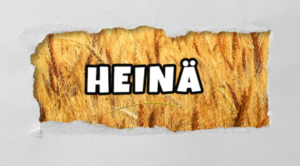Random Words #1: Heinä
“Random Words” is a new series I am hoping to produce every once in a while. The point of it is not so much to teach you one new word, but rather to explore what other words come up through association. Today: heinä!
If you’re truly passionate about expanding your vocabulary, you’ll grasp at any chance to further your knowledge. One way to do this is to just explore one word, its associations and all kinds of little things related to it.

The first of this series of Random Words is HEINÄ. Heinä means “hay”.
If you’ve made a start learning Finnish, you’ve probably come across this word when you were learning the names of the months. Heinäkuu is July. It’s not difficult to see the association: heinäkuu was an important month for Finnish farmers, who used to cut and collect their hay in July.
Heinä usually wasn’t farmed on fields (pelto) but rather on meadows (niitty). The fields were reserved for different kinds of grain (vilja) for human consumption (e.g. kaura, ohra, ruis) rather than food for livestock (rehu). Haymaking (heinänteko or heinänkorjuu) was considered such an important event that people actually dressed up for it in clean, light-colored clothes!
Before hay mowers (niittokone) were invented, farmers used scythes (viikate) for collecting the hay. They gathered (korjata) the hay and let it dry in the sun.
Heinä is also used in a couple of Finnish sayings:
- “Shoppailu on yleensä ollut vaimoni heiniä.”
Shopping has usually been my wife’s thing. - “Minun työkaveri puhuu puuta heinää.”
My co-worker just talks rubbish. - “Se on helppoa kuin heinänteko.”
It’s a piece of cake; super easy.
Can you think of any other words that are connected to heinä?
Which words do you think are most useful from the above?

Hi! People put light clothes on during hay making not because of holiday mood (it is a hard labour), but to avoid sun shock.
Yes it makes sense rather than to wear darker or black clothes making them more susceptible to get sun shock(reffering to heat stroke I assume?) as you say. Though wearing and having clothecover at all probably is to avoid sun burns in the high July sun. If sun screen’d been available historically I think shirtless and short pants would be the “tradition”.
I love Kaarija’s Song Puuta Heina. Good to know part of the lyrics now.